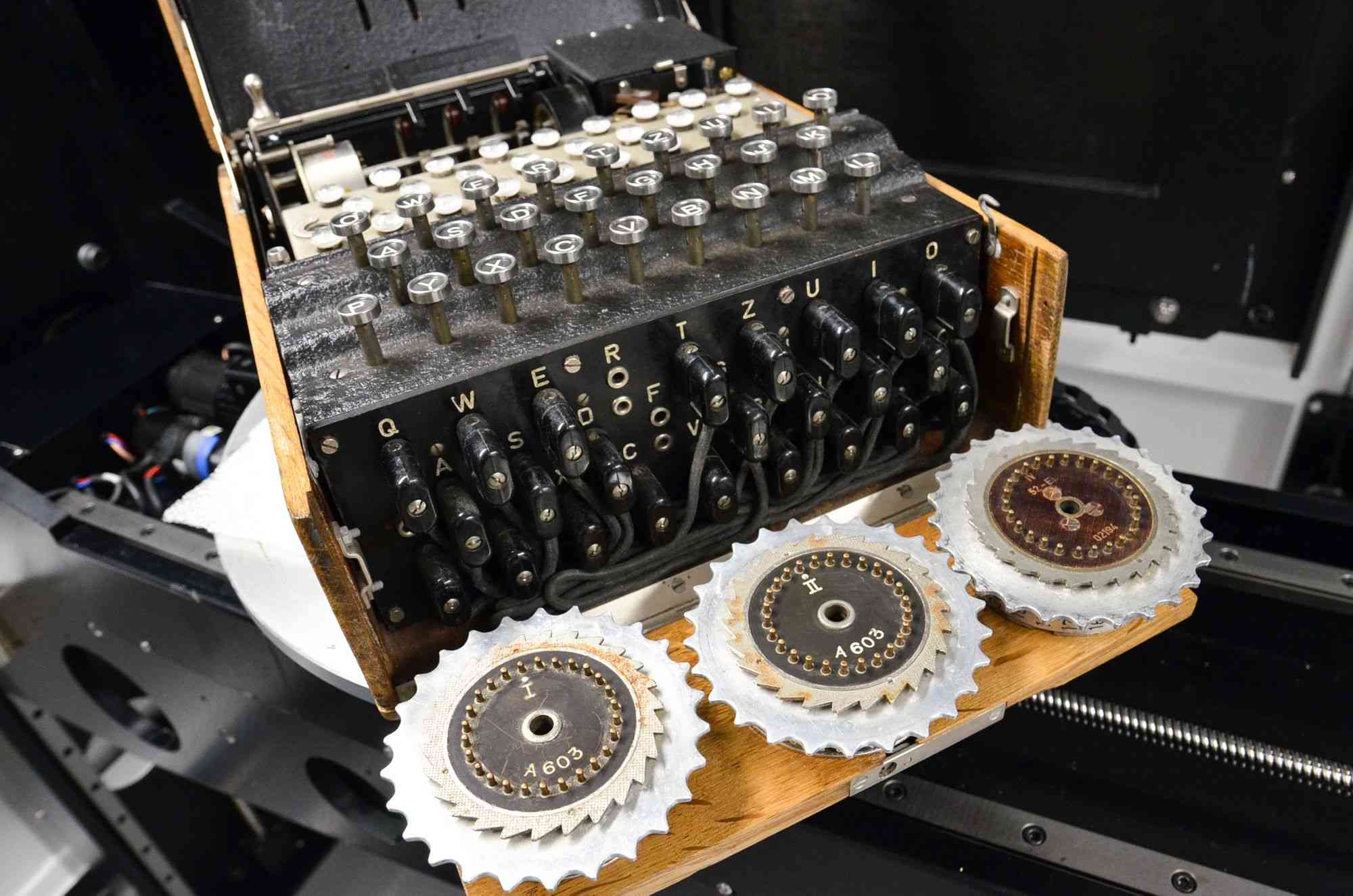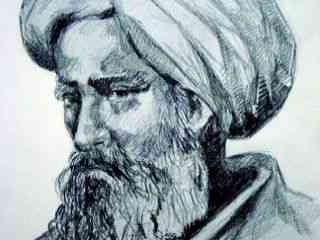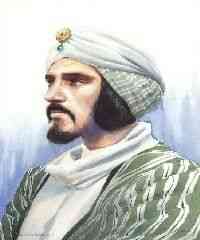From the day the writing was invented, there are people trying to send secret messages, either because their scripts contain sensitive information ... or just so they don't want intruders to read their writing. If you wanted to transfer secure information over writing our options were limited.
You only have to communicate it in secret in the middle of the night, for example, or send it with a person and have guards appointed to protect it, and these options are not considered safe for this degree. The solution that a number of people invented is encrypting their writings ... where you take the written message and turn it into something as if it is talismans that it can only be read by the required person.
When you have a giant country with some math and language proficiency, you can guarantee that your civilization will develop some kind of encryption ... We do not talk here about codes and passwords that are sometimes between you and your friends, no.
We are talking about coding based on mathematical and linguistic bases and rules the same kind of coding that we use every day on the Internet.

Since you used the Internet, sent a message, e-mail, or even used any kind of computers ... you used a kind of encryption even if you did not know about it ... Do you know the lock mark that appears in the browser in the top bar, if you see it this means You are sending and receiving information in encrypted form and no one should be able to see what you are doing.
If you want the truth, one of the main reasons why computers were invented was to deal with encrypted messages in times of war.
Yes ... encryption is as important to your digital life as the door lock is important to your life.
Muslims, and especially the Arabs among them, for a long time were kings in this field who did not invent it, of course, it had existed before, but cryptography was one thing and after the Arabs became something else. I don’t know why the Arabs in particular among the rest of the people were creative in it .. perhaps their love of language .. maybe it evolved They have mathematics ... perhaps the political situation in the Arab world ... but for some reason our Arab friends have made it incredibly impressive with the rest of the people of their time.

Do you want to know to what degree the Arabs have put their mark in this field?
Today's encryption word:
-Encipher
-cipher
-ciphering
It was derived from Arabic word (zero)
- Why did they call it Zero?
- It is said that the West did not know the zero as a value because it was not present in their numbers and did not use it in their calculations .. When they contacted the Arabs and learned mathematics from them and heard the idea of zero .. their minds were a little confused .. How is a number that has no value? Does it represent anything?
Since the idea was strange to them, they used it to express mysterious matters.
Bring your towels colleagues today, we will swim in the sea of Arab history, which no one cares about ...
But before we talk about it, let's take a quick tour of the history of coding before the Arabs.
Well .. the coding is from a very ancient time that appeared in Egypt during the days of the Pharaohs appeared in the Mesopotamian Valley appeared in Greece but it was not a science at that time ... it was more art than a science
Most of the coding in the ancient world was coding dependent on metaphors and a common culture between certain groups .. That is, when you are between your family and relatives you have special expressions and words that only you understand, this is the type that was common coding based on the common culture between you, there is no People in the universe did not have this coding .. Everyone has their secret words and expressions that others do not understand, but as we said at the beginning this type is not considered coding in its modern meaning because it does not have fixed and very limited rules in its uses this means that what was in attempts Early snap-based encryption.
For example, in Mesopotamia, they found some strange writings that they expected were primitive attempts to orderly encode in addition to Egypt and Mesopotamia. The Greeks had gentle attempts to hide messages in times of war if they needed to send an important message with sensitive information..what do they do? They take a man who trusts him, shaves his hair, and writes the message on his bald head and waits for his hair to grow and then sends him to any place they want ... If someone happens and objects to his path, he will not find a message with him and often leaves him to go and if he reaches his destination whenever he has to do it is shaving his head and so the message arrives For the wanted person ... although this is not a type of encryption as much as it is a kind of concealment of messages, but yes it was working
A second attempt in Greece, which is one of the first examples of real coding, was a thing called the scytale cipher in a nutshell .. It takes a stick or anything long and wraps it on the skin and writes on it what you want and if you open it the writing will seem incomprehensible and if you rewrite it you will be able to read What is written? The method needs thinking, but .. it is easy to break it. Just wrap the skin over anything of an appropriate size, and so the code is broken ... so it is not useful to that degree.
They had another thing called a polybius square that they used to substitute letters for numbers but it did not appear that the object was coding.
The Romans had another method they called the Caesar blade and this was smart at its time: Simply move the positions of the letters left or right and write the letter in the new order of letters.
Example / arrangement of regular letters..a..b..c..d..if we move the letters to the right a little what do we have..a thousand becomes B and B becomes C and so on and now you can use the new arrangement to write letters similar to talismans but your friend who It receives the message, which it can read once knowing how moving the letters.
The method is simple, but it was effective at that time, especially since three quarters of the people were illiterate and did not know how to read. Attempts to encode speech fulfill the purpose, but modest. This thing continued for a long time until the Arabs arrived.
With Arabs open to civilizations and other peoples and the growth of sciences, especially linguistic and mathematical, the art of coding is emerging and spreading, which also helped spread it is the presence of several Islamic countries that were trying to hide their secrets from some in addition to the presence of opponents to them from non-Muslims, but we do not want to enter into political history.
Arabs and Muslims looked at the old coding systems and said: This is toys. We can do something better.
An enormous number of scholars who wrote and spoke about cryptography or blinding appeared whenever they called it at that time
who are they:
Mohammed bin Al-Hassan Abu Al-Hassan Al-Jarhami
Khalil bin Ahmed Faraaheedi
Mohammed bin Ahmed bin Mohammed bin Tabata
Mohammed bin Ahmed bin Xian
Thoban bin Ibrahim with the Egyptian Nun
Isaac bin Ibrahim writer
Ali bin Mohammed destroyed Jeldaki
Asaad bin Mahdib bin Mattati
Othman bin Isa, the Baltic crown
Yaqoub bin Ishaq Al-Kindy
Ali bin Mohammed bin Al-Dariham
Jaber bin Hayyan
Ahmed bin Ali al-Qalqhtdi
Ahmed bin Mohammed Abu al-Qasim al-Iraqi
Dawood bin Haitham Al-Tannoukhi
Ibrahim bin Mohammed bin Dnennir
Ali bin Adlan grammar
Ahmed bin Ali bin Wahshia
Sahl bin Muhammad al-Sijistani
Mohammed bin Saeed Al-Baseer Al-Mousili
All of these names that are in front of you all have either written on or developed on it.
Side note / These famous names that have been writing on coding and writing down their ideas about it ... There are many others who excelled in it but did not write anything about it !! Why? The funny thing about Arab scholars is that many of them believed that writing about coding speech ... spoils the whole thing ... What is the use of inventing a secret writing system and teaching it to people in a book !! This was what at least many of them believed.

So you see a number of those who wrote on this topic speaking in the introductions of their books that they did not want to write these books but they are forced for some reason
The lesson learned here is ... sometimes you don't care about the scholars and their philosophy if there is someone who has useful knowledge or preserves an important history, let them document it somewhere (so that he does not die with them).
So let's choose one of the nice scientists we have on the list, Bin Adlan.
Ali bin Adlan Al-Nahwi (AD 1268-1187):
He was a poet and well-known that he was very smart. He wrote a group of books and touched on many topics, including coding methods. Let's take one of the parties that he talked about:
Encryption by substitution / these Arabic letters (A, B, C, D, E, F, G ......) are easy and we all know them. Alif is like a stick and B is like a plate ... imagine if we change the locations of the letters ( Not by moving it left or right as the Romans did. No) No, but we change everything, for example, (B) represents (E) and (C) represents (R) etc. at this way. You can take any understandable text and turn it into a group of talismans. Someone can understand it!
So on what basis do we change the letters places? What is the benefit of changing its locations as long as the person receiving the code does not know its order ??
The solution is really simple ... just agree with the person in advance on a specific arrangement .. Yes, there is no magic that's all you do.
Usually what they used to do was that the sender and recipient agree on a verse that is the key to decoding the code.
What is unique about the chosen verse is that it contains all the Arabic letters and does not contain duplicate letters ... this is not a coincidence this type of verses are carefully designed,For the idea that arranging letters in a poetic house is the arrangement of new letters
And just like that ... you have a secret message that no one else can read.
This was one of the simplest coding methods that Bin Adlan spoke about:
Message → key for decoding and encryption → successful code.
This small logic is one of the important principles used in the coding world, and many coding methods were built upon it ... The wonderful thing about this method is that you are not obligated to use the key that I used in the example .. You can invent any key and any arrangement you want for letters and you can change your key from time to time And another to ensure the safety of the blade.
However, the method has a major drawback. Once you know the "key of the poem", you can break the code in minutes. So this method is useful for you in case of an emergency if you want to send an urgent message. But you can do many things better than it ... and this is what the two were thinking about Ibn Darihim (m1312-H712) / Ibn Danair (M1187-H584).
They were both scientists and lived in different time periods, but they shared the strange names that had to do with money, and more importantly, they shared many ideas about coding. Ibn Dnienir / was an intelligent and handsome poet, white-skinned, blond hair, sharing grammar, calligraphy, and most importantly in the art of coding, but he was A Trouble Maker, and he had beliefs that he did not like much and above all he was accused of some bad behavior ... Let's say he entered into problems with the wrong people and his end was Never be happy.
Ibn Drihim / He was a different personality The boy came after our blond friend about 80 years ... His father died when he was young and left him a great fortune and after he grew up he became a great merchant and enjoyed the money .. He loved puzzles and riddles and loved to solve and learn about them ... so a man has a lot Of money and loves puzzles There is no science that can be enjoyed other than encryption.
He wrote many topics, including forensic science, mathematics, and others, but he was famous for his ideas about cryptography.
The two talked about a method by which they put the most important principle in the world of coding / taking the message to be encrypted → converting each letter in it to a number → a calculation is performed on the numbers → the numbers are returned to letters ... what !!!
Let's take all the letters ... okay?
For each letter we give a number, for example, /
A = 1, B = 2, C = 3 .... etc. These are the values that are usually given to letters. Okay.
If we want to encode this message (Sultan kicks in his face) we take each letter and convert it to a number, then we have a set of numbers .. Well, everything is normal, there is nothing special ... But look what these two do next ... We take these numbers and run on them. A mathematical operation, for example, we multiply it by 2, and the result we take and convert it to letters again !!!! Have you seen what they did. If you convert letters to numbers and do mathematical operations on numbers and convert the result into letters, you have a coded text that is difficult to break .. A word of 5 letters like "Sultan" turns into a code of 7 letters like "Qaseqbak" !!!
This principle:
(Converting text to digital data → Mathematically processing data → Converting data to text) is the basic principle that exists and is based on cryptography to date.
And these two founded it 800 years ago.
If you are wondering about how to say decoding again to read it .. It is assumed that, according to my understanding, the sender and the receiver are already in agreement with the numerical values of the letters and the mathematical operations that have been done ... then you reverse the process and extract the text and read it and everyone will be happy.
And if you do not understand how the extra letters come into the code! This is because the mathematical process sometimes does not produce numbers that are present in the table, so you have to decode the number to two numbers in the table, so you have two letters that represent one letter..and the good is that this is an additional layer of coding and this is excellent.
These are two simple examples of ancient encoding methods among Arabs and there are many other ways ... variations of speech forms, changing the letters of the word, inventing new symbols for letters, and speech becomes like a new language from space. And when the terror is combined with several ways of encoding with each other, the encryption becomes more robust. We sit from today to tomorrow and talk about other coding methods. However, there is a person who is difficult to talk about coding without mentioning his name because he did something that no one preceded him. This person is ..
Yaqoub Bin Ishaq (Al-Kindi) (M 805 / H 185) / is one of the first Arab philosophers. Those who know the history of encryption read an hour ago and shout: Why do not you talk about Al-Kindi !!! We cannot blame them explicitly .. It is unfair to speak about the matter and do not mention Al-Kindy.
Al-Kindi: He was a famous philosopher and one of the first to talk about coding between Arabs and describe many ways. Many people knew about the topic, but the most important of all is that Al-Kindi taught people how to break the codes. It is very important that you encode your sensitive information so that no one can see It has to do with it, especially in times of war, but the bitter truth that you quickly absorb is that when you develop a new technology to outdo others, your opponents and the people that are watching you from afar ... they will quickly copy them and begin to imitate you.
Like what you encode .. others encode.
With the development of coding and its spread among people, it became necessary to learn how to break the codes of your opponents because if you did not do it they would do it. What the Canadian did was that he began studying the coding techniques that existed in his time and began studying many languages and their properties and understood two things:
First / In every language there are letters that are used more than others, for example, in the Arabic language, the two most frequently used letters are undisputed (Alif, Lam). If you did not feel that before, we Arabs live a love affair with (the) definition. Not only the Arabic language, but all the languages have letters used more than others.
Al-Kindi started collecting the books around him and started counting the letters and numbers in them, and he also expects that he studied the lists that they extracted from others about the most used letters in the Qur’an,He was able to build a list of the most frequent letters in the Arabic language.

Second / It is usually in his time when you encode a text, the locations of letters do not change, all you do is change the shapes of letters. For example, if we took this sentence and coded it in the manner of Ibn Adlan, we notice that the shapes of the letters changed, but the arrangement of the letters, their frequency, and their relationship with each other are the same.
Because of these two Canadian notes, he was able to develop a way to break most of the codes in his time ... write the letters in your language from top to bottom according to their frequency, take the coded message, count the number of symbols or letters in them, and rank them from most to the lowest and .... I began to notice what was happening .. Most of the time, you find a clear convergence between the two lists. If the message is encoded in Arabic, you know that most of its letters are (alpha, lam), so it is very likely that the two most important symbols are a thousand and a lam, and so on with the other symbols. If you find a rare letter, it is likely that one of The letters at the bottom of the list can sit back, think, solve the letter this way and tux See their code little by little until the original text features begin to appear and it becomes easy for you to guess what the script is. The method, of course, contains more details than what we mentioned .. But now you have a simple idea of how it works.
This method was called Al-Kindi (the frequency of letters) or (the order of letters), but today it is called (Fraquancy Analysis) This method was one of the most important ways to break the codes that were present at that time. And it was used for a long time to decode the time of Al-Kindi in the third century AH to ... almost the two world wars.
I really don't know where Al-Kindy got this method ... Did he invent it himself? Or learned from anyone? ..But according to my knowledge that writing about it is considered the oldest thing in human history on code breaking ... This means (God Knows) that the invention of code breaking (or cryptanalysis) is a 100% Arabic invention.
If you are Arabic then you have something extra to be proud of. Al-Kindi, of course, not only developed the frequency of letters ... no, no, no ... he has a million things about coding and code breaking. He studied the harmony of letters with each other, and many letters do not come after some, and many are almost impossible to come after some in the Arabic language. He studied the most prevalent words and expressions, such as Basmalah (in the name of God, the Most Gracious, the Most Merciful), and the words of glorification (Praise be to God, Lord of the Worlds), and their expected places because breaking them is easier than others. He talked about different types of "simple" and "complex" encryption, and about the possibility of combining them to strengthen encryption.
We can take Al-Kindy or any coding scientist and talk about it until tomorrow.
Despite my talk about coding, I only touched the surface of the topic, so if you find yourself free one day, search for the early history of coding if you want to see a beautiful side of Arab history, no one talks about.
Thanks! Please research more about yourself.


